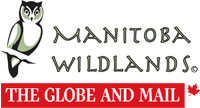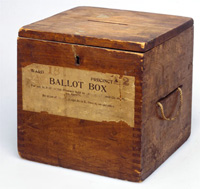
News |
- Explain Climate Change in Plain Language
- New Reality Checks - WMAs and Community Pastures
- Manitoba Wildlands Corrects Globe and Mail
- CIBC Urged to Respect Indigenous Rights
- Leaders Asked: Will They Stop Muzzling Science?
- Young Canadians Urge Action on Climate
- Unions and Civil Society Support Bolivia
- Crowsnest Headwaters Logging Opposed
- Election Forum and Vote Mob in Winnipeg
- Environmental Groups Issue Election Challenge
- Greenpeace Seeks Environmental Leadership
- Groups Provide Checklist, Analyses and Survey Outcomes
| Explain Climate Change in Plain Language | 14 May 11 |
 Roughly 400 scientists at a major conference on Arctic warming May 4, 2011 were told to use plain language to explain the dramatic melt in the region to a world reluctant to take action against climate change.
Roughly 400 scientists at a major conference on Arctic warming May 4, 2011 were told to use plain language to explain the dramatic melt in the region to a world reluctant to take action against climate change.James White, of the University of Colorado at Boulder, told fellow researchers to use simple words and focus on the big picture when describing their research to a wider audience. "Stop speaking in code. Rather than 'anthropogenic,' you could say 'human caused,'" said Prominent U.S. climate scientist Robert Corell. The scientists were discussing two new reports issued by the Arctic Monitoring Assessment Programme (AMAP), a scientific body set up by the eight Arctic rim countries. The first report "Climate Change and POPs: Predicting the Impacts" warns of Arctic warming twice the global average in recent decades, leading to revised projections of dramatically higher sea levels. The second report "Arctic Pollution 2011" shows that Global mercury emissions could grow by 25 percent by 2020 if no action is taken to control them, posing a threat to polar bears, whales and seals and the Arctic communities who hunt those animals for food. View May 5, 2011, May 4, 2011, May 3, 2011 Associated Press articlesView May 3, 2011 Reuters article View Arctic Monitoring Assessment Programme "Climate Change and POPs" View Arctic Monitoring Assessment Programme "Arctic Pollution" View Manitoba Wildlands Addressing Climate Change page Source:
Associate Press, and AMAP
|
|
 Print version Print version |
Top |
| New Reality Checks - WMAs and Community Pastures | 7 May 11 |
 Manitoba Wildlands is issuing a series of environmental Reality Checks in 2011, in advance of the Manitoba fall 2011 election. Each Reality Check is based on one issue or question, and public information that is easily available.
Manitoba Wildlands is issuing a series of environmental Reality Checks in 2011, in advance of the Manitoba fall 2011 election. Each Reality Check is based on one issue or question, and public information that is easily available.So far Manitoba Wildlands has completed five Reality Checks. Our two most recent Reality Checks reviewed Manitoba's Wildlife Management Areas (WMAs) and Community Pastures. Our most recent Reality Checks show that only 1/4 of the lands encompassed by the WMA system have permanent protection, and that Manitoba is behind other provinces like Saskatchewan in taking the steps to protect community pastures, including protecting grazing rights. "Ensuring that all of Manitoba's WMAs and Community Pastures receive permanent protection would go a long way towards the Manitoba Government fulfilling its long held commitment to protect more areas of Manitoba. They need to get on it!" said Manitoba Wildlands Director Gaile Whelan Enns. View Manitoba Wildlands Reality Checks 2011 pageView Reality Check-04: Are Manitoba Wildlife Management Areas Protected? View Reality Check-05: Community Pastures - Can We Protect These Lands? Source:
Manitoba Wildlands
|
|
 Print version Print version |
Top |
| Manitoba Wildlands Corrects Globe and Mail | 7 May 11 |
 An April 19, 2011 Globe and Mail centrefold feature, entitled "Preserving the Boreal Forest", included a map that inaccurately indicated Tolko's forest management area in Manitoba as 'logging activity suspended' due to the Canadian Boreal Forest Management Agreement (CBFMA).
An April 19, 2011 Globe and Mail centrefold feature, entitled "Preserving the Boreal Forest", included a map that inaccurately indicated Tolko's forest management area in Manitoba as 'logging activity suspended' due to the Canadian Boreal Forest Management Agreement (CBFMA).Tolko's forest management licence area in Manitoba is among the largest forest management areas in Canada. The mill has been operating, with different owners, since the 1950's. The mill operates every day, and produces kraft paper bags. The mill processes fibre from logging operations throughout the forest management area. A simple check of maps on the company website reveals that logging has only been suspended is small areas inside Tolko's forest management area. Given the inaccuracy of the information Manitoba Wildlands requested that the Globe and Mail publish a correction. "It is incumbent that the media ensure they provide accurate information, and we hope the Globe and Mail will set the record straight," said Manitoba Wildlands Director Gaile Whelan Enns. As of May 4, 2011 the Globe and Mail did not print the letter provided below. View April 23, 2011 Manitoba Wildlands Letter to the EditorView April 19, 2011 Globe and Mail article View Tolko "Canadian Boreal Forest Agreement" website View Tolko Highrock Forest Section Map (PDF) View Tolko Nelson River Forest Section Map (PDF) View Tolko Saskatchewan River Forest Section Map (PDF) Source:
Manitoba Wildlands, Tolko Website
|
|
 Print version Print version |
Top |
| CIBC Urged to Respect Indigenous Rights | 7 May 11 |
 First Nations youth leader Jasmine Thomas, who represents the five First Nations of the Yinka Dene Alliance in British Columbia, attended the Canadian Imperial Bank of Commerce (CIBC) annual general meeting (AGM) in Winnipeg to warn shareholders and executives: Do not finance Enbridge or its Northern Gateway Pipeline project, since Enbridge fails to respect the authority of First Nations along the proposed pipeline route.
First Nations youth leader Jasmine Thomas, who represents the five First Nations of the Yinka Dene Alliance in British Columbia, attended the Canadian Imperial Bank of Commerce (CIBC) annual general meeting (AGM) in Winnipeg to warn shareholders and executives: Do not finance Enbridge or its Northern Gateway Pipeline project, since Enbridge fails to respect the authority of First Nations along the proposed pipeline route."We would like CIBC to adopt a policy that would require the bank to consider whether its clients have obtained the free, prior and informed consent of affected indigenous peoples," Thomas told the AGM, adding, "CIBC should catch up with Royal Bank and TD Bank, which have already committed to recognize our right to consent." The 1,170 km (727 mile) pipeline would carry crude oil across more than 1,000 streams and rivers, mountain ranges, avalanche-prone terrain and rainforest ecosystems before being loaded onto at least 150 tankers annually. More than 150 First Nations, the Union of B.C. Municipalities, numerous businesses, environmental organizations and prominent Canadians oppose the Enbridge pipeline. "CIBC needs to behave ethically and stop raising money for Enbridge, which intends to bring destructive tar sands pipelines through our lands even though we have said 'no'. Their pipeline would violate our human rights and harm my people," said Thomas. The President and CEO of Enbridge, Patrick D. Daniel, also sits on the CIBC board of directors. View April 28th, 2011 Yinka Dene Alliance press releaseView April 28, 2011 Yinka Dene Alliance hand-out View April 28th, 2011 Canadian Press article View April 29th, 2011 Winnipeg Free Press article View March 31, 2010 Manitoba Wildlands news item Source:
Yinka Dene Alliance
|
|
 Print version Print version |
Top |
| Leaders Asked: Will They Stop Muzzling Science? | 30 April 11 |
 The Canadian Science Writers' Association (CSWA) is concerned Canadian journalists have been denied access to government scientists doing research.
The Canadian Science Writers' Association (CSWA) is concerned Canadian journalists have been denied access to government scientists doing research.The problem became critical when Canada's Conservative government implemented "Communications policy of the Government of Canada" August 1, 2006. The policy calls on public servants to speak "openly" with Canadians, but in practice the new rules required that "subject matter experts" and the minister's director of communications filter statements of government scientists. In response, and during the federal election, the CWSA-representing more than 500 science journalists, communicators, publicists and authors-sent an open letter to Conservative Leader Stephen Harper, Liberal Leader Michael Ignatieff, NDP Leader Jack Layton and Green Party Leader Elizabeth May. "All political parties repeatedly make promises to promote government openness and accountability. It is in this spirit that we ask to tell us and the public how you would guarantee freer channels of communication. We want to know because the current Harper government's restricted access to information impedes the public's right to know about the research and studies it funds," states the letter. The letter notes that every year, several billion dollars of tax-payers' money is invested in made-in-Canada research. "Let the federal scientists inform and enliven understanding. They are public servants, doing science for the Canadian public," concludes the letter. The Liberal Party of Canada and Green Party of Canada both offered their support for the CWSA letter. As of April 27, 2011 the Conservatives and the NDP had not responded to the CWSA letter. View April 27, 2011 Green Party of Canada press releaseView April 26, 2011 CBC News article View April 25, 2011 CWSA Open Letter to Canada's Political Leaders View September 20, 2010 CBC News article View August 1, 2006 "Communications policy of the Government of Canada"
Sources: CWSA
|
|
 Print version Print version |
Top |
| Young Canadians Urge Action on Climate | 30 April 11 |
 Canadian Youth Climate Coalition (CYCC) - a united front of youth from across Canada dedicated to tackling the biggest challenge of our generation: climate change - has a set of demands and reviewed the climate platform of Canada's five major political parties.
Canadian Youth Climate Coalition (CYCC) - a united front of youth from across Canada dedicated to tackling the biggest challenge of our generation: climate change - has a set of demands and reviewed the climate platform of Canada's five major political parties.The CYCC has five climate demands:
The demands were delivered to Leaders of Canada's major political parties. Green Party Leader Elizabeth May not only accepted the CYCC's demands, but she agreed to sign on right then and there! No response has been received from the other political leaders. The CYCC "Climate Report Cards" provide a set of one-pagers about the climate, environmental and inter-generational initiatives promised in each of the five major party platforms. This project provides a resource for informed voting, though the CYCC in no way endorses nor denounces any party but have created the cards as an educational tool. View April 26, 2011 CYCC "Climate Report Cards"View April 22, 2011 CYCC Demands View April 2011 CYCC "Wings of Change" statement (PDF) View CYCC webpage
Sources: CYCC
|
|
 Print version Print version |
Top |
| Unions and Civil Society Support Bolivia | 30 April 11 |
 On April 20, the United Nations General Assembly debated a proposal introduced by Bolivia, with support of other South American countries, to adopt a Universal Declaration of the Rights of Nature. The proposed global treaty says "Mother Earth has the right to exist, persist, and to continue the vital cycles ... that sustain all human beings."
On April 20, the United Nations General Assembly debated a proposal introduced by Bolivia, with support of other South American countries, to adopt a Universal Declaration of the Rights of Nature. The proposed global treaty says "Mother Earth has the right to exist, persist, and to continue the vital cycles ... that sustain all human beings."Bolivia marked Earth Day (April 22) with its Law of Mother Earth, which will establish eleven new rights for nature, including the rights not to be polluted and to continue vital cycles free from human interference. Meanwhile, Canada's political and media establishment's election national election campaign barely mentions the world's ecological crisis. A conference entitled "Cochabamba+1", in Montreal April 15-17, marked the first anniversary of a world movement to defend the "rights of Mother Nature." More than 300 high-profile participants shows Bolivia's bold approach is gaining increased support in Canada. "Civil society must unite with the Cochabamba platform" said Polaris Institute director Tony Clarke said. "What kind of society could we build with laws that actually give the Earth and its species the right to exist and not be destroyed by us? It's introducing balance into our economic and development system," commented Council of Canadians Chairperson Maude Barlow. The event was jointly sponsored by Alternatives, a Quebec-based social justice organization, and Canadian Dimension. Supporters include Council of Canadians, Greenpeace, Indigenous Environmental Network, and major unions: CAW, CSN, CSQ, CUPE, CUPW, FTQ, and PSAC. View April 22, 2011 Climate and Capitalism articleView April 20, 2011 Toronto Star article View April 20, 2011 New York Daily News article View April 19, 2011 Toronto Star article
Sources: Climate and Capitalism & Toronto Star
|
|
 Print version Print version |
Top |
| Crowsnest Headwaters Logging Opposed | 30 April 11 |
 Local and national conservation groups have launched a market action against clear-cut logging in the Crowsnest Forest, at the head waters of the water-stressed South Saskatchewan River system, which supplies water to the prairie provinces.
Local and national conservation groups have launched a market action against clear-cut logging in the Crowsnest Forest, at the head waters of the water-stressed South Saskatchewan River system, which supplies water to the prairie provinces.Spray Lake Sawmills (SLS) is the only sawmill logging in the Crowsnest Forest. Its mill is located in Cochrane, west of Calgary, Alberta. Eighty-seven lumber retailers in southwest Alberta received letters asking them to decline selling SLS wood from the Crowsnest Forest and instead sell Forest Stewardship Council (FSC) certified wood. Citizens are also asked to check their local retailer and to email the Alberta Foothills Network to ask the retailer to sell FSC certified wood instead. "Southern Alberta isn't short of fence posts or lumber. It's short of the three big Ws: water, wildlife habitat and wildlands, including for outdoor recreation and tourism," observes Dianne Pachal of Sierra Club Canada. The initial round of public input on a plan for the South Saskatchewan region found the majority of respondents want clear-cut logging ended throughout the region. They placed tourism and recreation as second only to agriculture for future economic growth in the region, with logging last. View April 26, 2011 Siera Club of Canada press releaseView April 26, 2011 Nanton News article
Sources: Sierra Club
|
|
 Print version Print version |
Top |
| Election Forum and Vote Mob in Winnipeg | 23 April 11 |
 Two hundred voters packed the First Unitarian-Universalist Church in South Central Winnipeg for a candidates’ environment forum Wednesday April 20.The event was organized by Green Action Centre, Manitoba Eco-Network, Green Action Committee of the Unitarian Church, and Provincial Council of Women, moderated by CJOB Radio host Richard Cloutier.
Two hundred voters packed the First Unitarian-Universalist Church in South Central Winnipeg for a candidates’ environment forum Wednesday April 20.The event was organized by Green Action Centre, Manitoba Eco-Network, Green Action Committee of the Unitarian Church, and Provincial Council of Women, moderated by CJOB Radio host Richard Cloutier.Liberal, Ilona Niemczyk, New Democrat, Dennis Lewycky, and the Green Party’s Jacqueline Romanow debated issues including climate change, nuclear power and food security. The Conservative party declined to participate. Debate among the candidates was respectful and civil with many areas of shared agreement. Full video of the debate is available on youtube. Audio will be aired on CKUW 95.9 fm in Winnipeg on Monday, April 25 at 5:30 pm, with archived audio files available online. Meanwhile students in Winnipeg are participating in the nationwide “Vote Mob” movement. On April 27th at noon, university students will gather at University of Winnipeg Centennial Hall escalators to film a YouTube video for Lead Now, an independent, youth-led organization that helps Canadians of all generations participate in their democracy. Vote Mobs encourage young people to vote and to inform politicians that youth are engaged and empowered. The event does not endorse any particular candidate or political party. View April 21, 2011 Green Action Centre blog postView April 20, 2011 Winnipeg Election 2011 Forum on the Environment on Red River Pete youtube channel View April 20, 2011 University of Winnipeg press release View CKUW 95.9 FM (Winnipeg) webpage View Lead Now webpage
Sources: Green Action Centre & University of Winnipeg
|
|
 Print version Print version |
Top |
| Environmental Groups Issue Election Challenge | 23 April 11 |
 During Canada's federal election campaign and on the eve of Earth Day eleven Canadian environmental organizations are sending political leaders a united message to take concrete and immediate action to address Canada's urgent environmental challenges. Together they identified challenges the parties need to come clean on during this election.
During Canada's federal election campaign and on the eve of Earth Day eleven Canadian environmental organizations are sending political leaders a united message to take concrete and immediate action to address Canada's urgent environmental challenges. Together they identified challenges the parties need to come clean on during this election.Stating that environmental protection is key to promoting a strong economy, prosperous families and individual health, the environmental leaders identified: fighting climate change, economic stability, investing in renewable energy, creating healthy communities, and protecting public land and water. "There has been much talk about securing our economic future during this election, but Canada's economy is wholly dependent on our environment. Protecting our environment is essential to ensuring Canada's economic prosperity," said Gerald Butts of World Wildlife Fund Canada. "Our kids will have to compete for jobs in the clean energy market, and they will only succeed if our government keeps pace with the investments leading countries are making," said Ed Whittingham of the Pembina Institute. "Air pollution in our cities is causing asthma and costing us millions in health care expenses," said Rick Smith of Environmental Defence. "Putting a price on pollution, using energy more efficiently and shifting to cleaner energy sources will save lives and money." View the April 21, 2011 Pembina Institute, et. al. press releaseView April 21, 2011 Montreal Gazette article View April 14, 2011 West Coast Environmental Law blog post View Climate Action Network "2011 Federal Election Watch" webpage
Sources: Pembina Institute, Climate Action Network Canada, World Wildlife Fund, Environmental Defense
|
|
 Print version Print version |
Top |
| Greenpeace Seeks Environmental Leadership | 23 April 11 |
|
"Political leaders will have to demonstrate a clear action plan to meet Canada's greenhouse gas emissions targets if they intend to improve Canada's international reputation and ensure Canada does its fair share," said Bruce Cox of Greenpeace. For Greenpeace, a candidate who supports climate action, also supports:
Greenpeace also provided yes/no assessments of the positions of the Leaders of Canada's five largest parties with respect to the five points listed above. Green Leader Elizabeth May and NDP Leader Jack Layton support all five issues. Bloc Leader Gilles Duceppe supports four of the issues. Liberal Leader Michael Ignatieff supports three. Conservative Leader Stephen Harper doesn't support any of these initiatives. Greenpeace blogs also offer more detailed analysis on party platforms. View April 21, 2011 Greenpeace joint press releaseView April 15, 2011 Greenpeace feature "Climate Change on the Agenda" View April 11, 2011 Greenpeace blog "The Orange and the Green" View Greenpeace April 10, 2011 blog "Conservative Platform" |
|
 Print version Print version |
Top |
| Groups Provide Checklist, Analyses and Survey Outcomes | 23 April 11 |
 Pembina Institute, with Environmental Defence, Équiterre, CPAWS, and Climate Action Network Canada, released a checklist of criteria to assess party platforms just after the May 2, 2011 Canadian election was called.
Pembina Institute, with Environmental Defence, Équiterre, CPAWS, and Climate Action Network Canada, released a checklist of criteria to assess party platforms just after the May 2, 2011 Canadian election was called.Then a survey to the five political parties in Canada was circulated, including questions on protection of Canada's lands and water, clean energy, climate change, oil sands and toxic chemicals in consumer products. All parties except the Conservatives responded. "The good news is that there is a fair degree of common ground among the parties that responded on issues that matter to voters, like tackling global warming and getting toxic bisphenol A out of our food cans," said Gillian McEachern of Environmental Defence. "We're disappointed that the Conservative Party did not choose to give voters information on where they stand on these issues." Pembina Institute also released a comparison of party positions on carbon pricing, and a platform analysis for Conservatives, Liberals, Bloc, NDP, and Green Party. View April 18, 2011 Pembina Institute/ Environmental Defence/ Équiterre/ CPAWS press releaseView April 18, 2011 Canadian Press article View April 13, 2011 Pembina Institute blog post View April 11, 2011, April 10, 2011, April 8, 2011, April 7, 2011, and April 3, 2011 Pembina Institute releases about party platforms View April 1, 2011 Pembina Institute backgrounder (PDF)
Sources: Pembina Institute
|
|
 Print version Print version |
Top |


 RSS Feeds:
RSS Feeds: